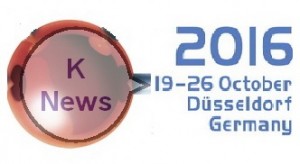CIRCULAR ECONOMY: Plastics trade groups present joint proposals / Shaping EU sustainability package
 Three industry associations representing different links in the plastics value chain – European Plastics Converters (EuPC; Brussels / Belgium;www.plasticsconverters.eu), the converters’ grouping, PlasticsEurope (Brussels; www.plasticseurope.org), which represents the interests of producers, and Plastics Recyclers Europe (PRE, Brussels; www.plasticsrecyclers.eu), the voice of recyclers – have published a joint paper with recommendations for building what they call “a truly European Circular Economy for plastics.
Three industry associations representing different links in the plastics value chain – European Plastics Converters (EuPC; Brussels / Belgium;www.plasticsconverters.eu), the converters’ grouping, PlasticsEurope (Brussels; www.plasticseurope.org), which represents the interests of producers, and Plastics Recyclers Europe (PRE, Brussels; www.plasticsrecyclers.eu), the voice of recyclers – have published a joint paper with recommendations for building what they call “a truly European Circular Economy for plastics.
Since the European Commission presented its reworked proposals for a Circular Economy in December 2015 – see Plasteurope.com of07.12.2015 – the trade groups have commented separately on various aspects of the overarching plan. The strategy paper presented this week in Brussels outlines common talking points the players want to leverage to help mould the European sustainability package into its final shape. As they note, the plastics industry is an important European stakeholder with over 62,000 companies providing more than 1.4m jobs and contributing EUR 6 bn to the EU’s public finances annually.
At the top of the priority list sits “zero plastics to landfill 2025, a concept to which the industry has subscribed for some time. It goes slightly beyond the Commission’s proposal to limit landfilling to 10% by that date, although the plastics players believe the EU’s plan to have 55% of plastic packaging prepared for reuse and recycling by 2025 as a step towards this goal is “challenging. Nevertheless, the paper says the trade groups are “willing to continue to play our part and call on the other relevant stakeholders to act, too.
As a step towards fulfilling the EU targets, the plastics industry believes the Commission should require the mandatory separate collection of all packaging from residual waste by 2025 and establish a uniform methodology for the calculation of its targets for preparing the material for reuse and recycling as well as developing a yardstick for recycling performance. This, the strategy paper says, “would set a level playing field for all actors on the market and enable an accurate overview of member states’ performance as well as meaningful comparisons.
Furthermore, the industry would like to see the EU adopt uniform quality standards for plastic waste and its treatment, including specifications for sorted waste, harmonisation of testing methods for recycled plastic materials and certification of plastic recycling operations. “Innovation in technologies throughout the whole plastics value chain should be stimulated to increase the potential for recycling, the paper concludes.
With individual points still left to be hammered out, the associations agree that the Commission is basically on the right track. EuPC president Michael Kundel said the Circular Economy concept “is the right way forward for the plastics industry, as it will also guide consumers and public authorities in the same direction. The industry, he said, will work together to develop innovative tools and new business models as well as quality recyclates that will meet the markets’ needs.
Patrick Thomas, president of PlasticsEurope, said the Commission’s package “is an opportunity to achieve a more resource-efficient Europe. At the same time, he stressed that for the Circular Economy to deliver long-term and sustainable environmental benefits, “it is essential that the whole lifecycle of products is taken into account from the perspective of a low-carbon economy.
Ton Emans, president of PRE, underscored that “recycling will play a growing role in plastics and called the EU’s current legislative push a step in the right direction. Building on its common platform, he said the stakeholders “have more work to do in terms of design for recycling, controls of waste export and pull mechanisms.













